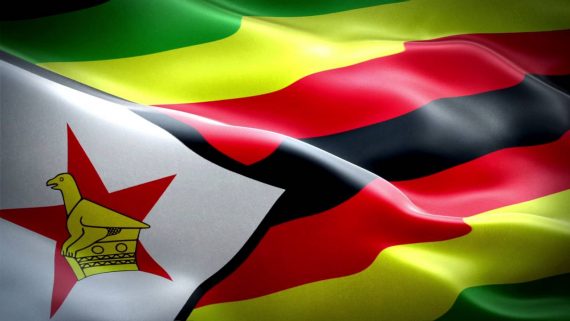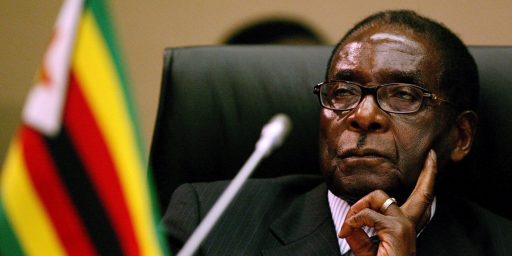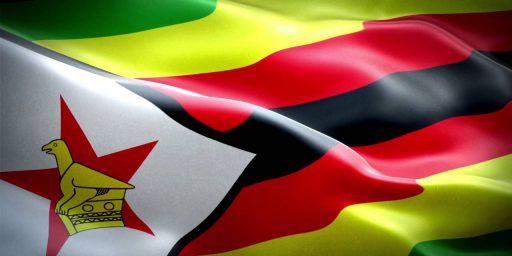Robert Mugabe Ignores Deadline For Resignation
The next step in Zimbabwe seems entirely unclear as long-time dictator Robert Mugabe refuses to formally give up power.
Robert Mugabe, who has been held under what amounts to house arrest by the military since last week after ruling over Zimbabwe for more than three decades, is refusing to step aside as President of Zimbabwe:
HARARE, Zimbabwe — A day after President Robert Mugabe of Zimbabwe stunned his nation by not announcing his resignation, the 93-year-old leader on Monday ignored an ultimatum from his own party demanding he step down.
The missed deadline, which was set by the ruling ZANU-PF party on Sunday, is expected to lead to a move by Parliament to impeach him — a process that could take weeks. The protracted negotiations between military leaders who seized power on Wednesday and Mr. Mugabe have frustrated Zimbabweans who had hoped for a quick resolution to the standoff.
Though visibly enfeebled, Mr. Mugabe has shown the negotiating skills that have kept him in power for 37 years. Allies of the military and Emmerson Mnangagwa, the vice president whose firing triggered the chain of events leading to the military intervention, urged lawmakers to impeach the president as soon as possible.
“We want him out of office immediately,” Christopher Mutsvangwa, the powerful head of the war veterans association, said at a news conference on Monday, urging ruling party lawmakers to work with the opposition to remove the president.
He added that war veterans, who helped organize a rally against Mr. Mugabe on Saturday, would stage another one in the coming days.
Despite such calls, Mr. Mugabe’s swift removal is running into obstacles.
Military officers have insisted their takeover was not a coup, and have tried to give their intervention a veneer of legality — portraying it as an attempt to save the ailing Mr. Mugabe from a faction led by his wife, Grace, that had effectively seized control of the government.
But to complete this picture of legality, they need Mr. Mugabe’s cooperation — a fact that the president clearly understands and is exploiting as he reportedly negotiates his future and that of his family.
The quandary also helps explain the continued absence of Mr. Mnangagwa, who had been engaged in a long-running feud with the president’s wife. Mr. Mugabe had taken his wife’s side by firing Mr. Mnangagwa and then trying to have the nation’s top military commander, Gen. Constantino Chiwenga, arrested. That led to the military intervention.
Military leaders have taken great pains to remove any trace of Mr. Mnangagwa’s involvement in the intervention itself, clearly believing that it would damage him politically as he moves to succeed Mr. Mugabe.
Mr. Mnangagwa has not been seen in public since he was fired. He has yet to return to Zimbabwe even though ZANU-PF named him as its new leader on Sunday, after expelling Mr. Mugabe from its ranks.
(…)
Though the impending end of the Mugabe era pleased most Zimbabweans, many remained cautious about Mr. Mnangagwa, who was long known for being the president’s ruthless enforcer.
“The way Mugabe has been running this country is the same way Mnangagwa is going to do it,” said Catherine Mukwapati, 34, who was walking in central Harare with her 3-year-old daughter.
Claris Madhuku, 38, who was sitting on a bench in Africa Unity Square, said he was skeptical of Mr. Mnangagwa’s close ties to the military. The former vice president, he added, had emerged victorious over a rival faction because his own “just fortunately won the backing of the army.”
Still, Mr. Madhuku was hopeful that the economy would improve under Mr. Mnangagwa, who has a reputation for pragmatism and for being open to outside investors.
As I noted yesterday, Mugabe was given until today to either step aside or face impeachment by the legislature, so it would appear that the ball is now in their court. Given the fact that the body is under the control of the same ruling party that ejected Mugabe the outcome of that procedure seems to be inevitable. Additionally, while Mugabe remains the de jure leader of the country it’s clear that he doesn’t actually hold the reins of power at this point and that the military that led what looks for all the world at this point to have been a coup d’etat is effectively in control of the country. What this means, of course, is that Mugabe’s fate is no longer up to him and that his removal is an accomplished fact for all intents and purposes. It’s also unclear what happens from here regarding the massive fortune that Mugabe and his wife are rumored to have gathered due to corruption and graft over the years, most of which is likely stored in banks outside the country. For example, if Mugabe and his wife are allowed to leave the country will they be able to access these funds or will the military or whoever takes control of the country seek to repatriate that money? That’s something only time will tell us.
Also unclear is who or what succeeds Mugabe as the leader of Zimbabwe. The military seems to desire that Mugabe’s biggest political rival, Emmerson Mnangagwa, who had been Vice-President of the country before being ousted by Mugabe in what most people believe was an effort on his part to get his wife appointed as Vice-President so that she could succeed him in power. As noted, though, Mnangagwa remains out of the country and it is unclear if or when he might return. Additionally, given the fact that he was mainly known as one of Mugabe’s chief enforcers when he was in office it’s unclear what exactly would be better if he ended up in power at the end of this process. Ideally, of course, Mugabe’s ouster would be followed by free, fair, and open elections that included opposition parties and international monitors to make sure that the process went forward the way it was supposed to. At this point, the likelihood of that happening anytime soon seems to be quite low.




